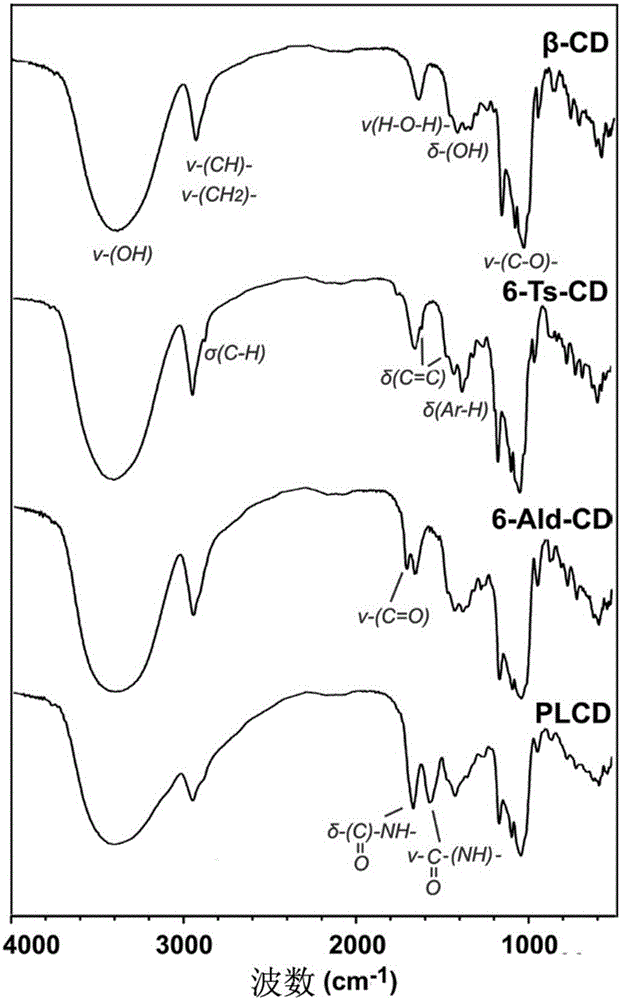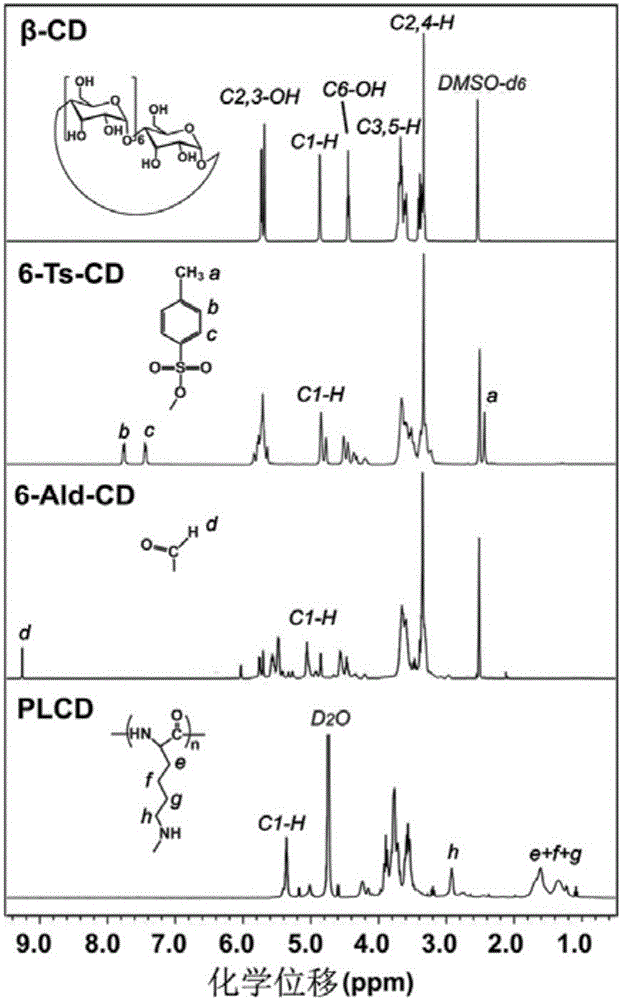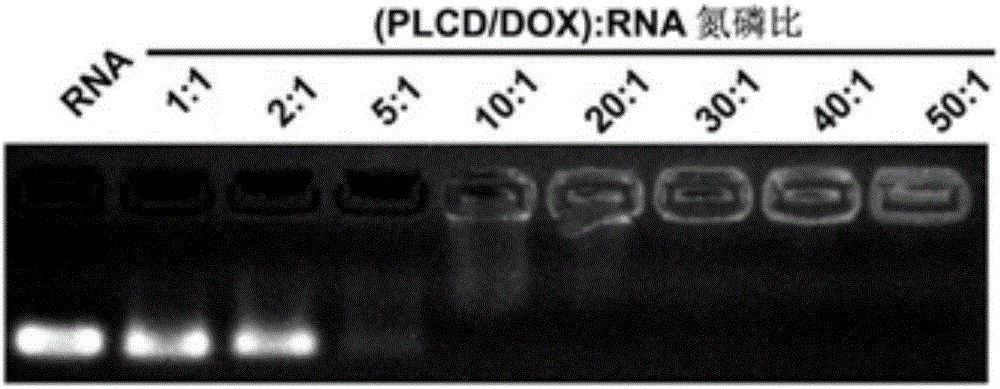Tumor-targeting nanoparticles co-loading chemotherapy drug and nucleic acid and preparation method thereof
A chemotherapeutic drug and nanoparticle technology, applied in the direction of antineoplastic drugs, drug combinations, pharmaceutical formulations, etc., to achieve the effect of non-immunogenicity, easy operation, and inhibition of cell proliferation
- Summary
- Abstract
- Description
- Claims
- Application Information
AI Technical Summary
Problems solved by technology
Method used
Image
Examples
Embodiment 1
[0050] (1) Synthesis of polylysine grafted β-cyclodextrin derivative (PLCD)
[0051] Dissolve 282mg (0.25mmol) 6-Ald-CD, 57mg (where the lysine structural unit is 0.25mmol) poly-L-lysine hydrobromide in 5mL acetate buffer solution (0.2M) pH 4.4 Stir the reaction at room temperature for 1h, add 62.8mg (1mmol) sodium cyanoborohydride, continue stirring at room temperature for 72h, add 2M NaOH aqueous solution to adjust the system to neutral, and then transfer the reaction system to a dialysis bag (the molecular weight cut-off is 7000Da ), dialysis in ultrapure water for 2 days, the dialysate is freeze-dried, and the obtained white flocculent product is polylysine grafted β-cyclodextrin derivative (PLCD), in which the degree of substitution of β-CD is 12.9%.
[0052] The viscosity average molecular weight of the poly-L-lysine hydrobromide is 15,000 to 30,000 Da;
[0053] The chemical structure of PLCD was characterized by infrared spectrometer and nuclear magnetic resonance spectromete...
Embodiment 2
[0067] In vitro drug release test
[0068] Take three PDR and HPDR prepared in Example 1, each 1mL, transfer to a dialysis bag (the molecular weight cut-off is 8000~14000Da), respectively place them in 10mL pH 5.0, 6.5 and 7.4 PBS solution at 37℃ Light oscillation (100rpm), at different time points (see Figure 8 ) Take out 1.5 mL of the medium for testing, and add an equal volume of fresh dialysis medium; use an ultraviolet spectrophotometer to detect the release of DOX (detection wavelength is 480 nm). The cumulative drug release rate is calculated according to the following formula: DOX cumulative release rate=(DOX release amount / total DOX input)×100%. See DOX release curve Figure 8 , Showing slow release characteristics, and has significant pH sensitivity.
Embodiment 3
[0070] Cell Uptake Research
[0071] Replace Control RNA in Example 1 with FAM-RNA. Others are the same as Example 1. The prepared PDR and HPDR are named PDR respectively FAM And HPDR FAM .
[0072] Use the liver cancer cell line MHCC-97H to examine PDR FAM And HPDR FAM The ability and location to enter cells; the above cells are at 37℃, 5% CO 2 Cultivate in an incubator, the medium is high-sugar DMEM medium containing 10% FBS; when the cells grow in the logarithmic growth phase, digest the cells according to 5×10 4 The cell / well density is seeded in a 12-well plate pre-laid with a special glass sheet for laser confocal. After 24 hours of culture, free DOX, FAM-RNA, PDR diluted in serum-free medium are added FAM And HPDR FAM , Make the final concentration of DOX in the system 3.3μg / mL and the final concentration of FAM-RNA 1.0μg / mL; after incubating for 4h, the cells are fixed with 4% paraformaldehyde, the nucleus is stained with DAPI, the glass slide is taken out, and the lase...
PUM
| Property | Measurement | Unit |
|---|---|---|
| viscosity average molecular weight | aaaaa | aaaaa |
| molecular weight | aaaaa | aaaaa |
| particle diameter | aaaaa | aaaaa |
Abstract
Description
Claims
Application Information
 Login to View More
Login to View More - R&D
- Intellectual Property
- Life Sciences
- Materials
- Tech Scout
- Unparalleled Data Quality
- Higher Quality Content
- 60% Fewer Hallucinations
Browse by: Latest US Patents, China's latest patents, Technical Efficacy Thesaurus, Application Domain, Technology Topic, Popular Technical Reports.
© 2025 PatSnap. All rights reserved.Legal|Privacy policy|Modern Slavery Act Transparency Statement|Sitemap|About US| Contact US: help@patsnap.com



